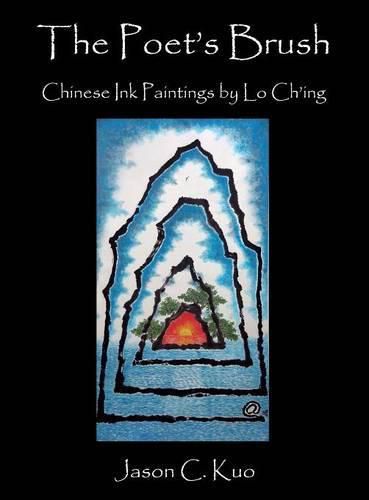Readings Newsletter
Become a Readings Member to make your shopping experience even easier.
Sign in or sign up for free!
You’re not far away from qualifying for FREE standard shipping within Australia
You’ve qualified for FREE standard shipping within Australia
The cart is loading…






This title is printed to order. This book may have been self-published. If so, we cannot guarantee the quality of the content. In the main most books will have gone through the editing process however some may not. We therefore suggest that you be aware of this before ordering this book. If in doubt check either the author or publisher’s details as we are unable to accept any returns unless they are faulty. Please contact us if you have any questions.
Lo Ch'ing is one of China’s foremost contemporary poet-painters. Despite the differences in their circumstances, many contemporary Chinese painters share one common trait: they have been stimulated by contact with contemporary Western art, but they did not merely imitate it; instead, they have rediscovered the abstract and expressionistic possibilities in their own tradition. It is in this sense that they are heirs to the great tradition of Chinese painting. Through their synthesis of the theories, techniques and styles of traditional literati painting in their own work, they were able to achieve innovation that enriched the tradition. These artists exemplify one of the best ways to be contemporary Chinese artist.
Lo Ch'ing has internalized such conflicting state of tradition and modernity (or even post-modernity, if you will) in his work. The Chinese tradition takes a not so subtle turn in the Taiwanese environment. Indeed, Taiwan was, incidentally, the most curious and embracing place for matters of experimental nature, particularly during late 1970’s to 1980s when Lo Ch'ing rose to fame. The rise of industrialization, post-industrialization, and curious issue of Taiwan’s cultural identity created a nurturing and controversial ground for creative talents. Industrialization and post-industrialization are subjects of Lo Ch'ing’s work. Certainly, there is an oddity in Lo Ch'ing’s depiction of alien saucers and floating rocks and mountains, yet Lo Ch'ing’s work presents a fresh curiosity that had not been explored in the practice of in painting precisely for that reason. Scholars often used the phrase reinvention of the Chinese landscape to describe and define Lo Ch'ing’s work and his motivation behind it, and it’s not entirely correct. To put it in correct historical term, however, it was not the artist who industrialized the landscape, not to mention one can easily argue that the urban landscape of Taiwan is one that is drastically different than landscapes in China. Lo Ch'ing’s'work has a heightened sense of awareness in its presentation of any subject in this matter, and that Lo Ch'ing’s work is very conscious of the environment that its content was derived from. Urbanity, interestingly enough, would be an idea that is in opposition to the tradition of Chinese literati landscape painting, for it means the destruction of nature.
$9.00 standard shipping within Australia
FREE standard shipping within Australia for orders over $100.00
Express & International shipping calculated at checkout
This title is printed to order. This book may have been self-published. If so, we cannot guarantee the quality of the content. In the main most books will have gone through the editing process however some may not. We therefore suggest that you be aware of this before ordering this book. If in doubt check either the author or publisher’s details as we are unable to accept any returns unless they are faulty. Please contact us if you have any questions.
Lo Ch'ing is one of China’s foremost contemporary poet-painters. Despite the differences in their circumstances, many contemporary Chinese painters share one common trait: they have been stimulated by contact with contemporary Western art, but they did not merely imitate it; instead, they have rediscovered the abstract and expressionistic possibilities in their own tradition. It is in this sense that they are heirs to the great tradition of Chinese painting. Through their synthesis of the theories, techniques and styles of traditional literati painting in their own work, they were able to achieve innovation that enriched the tradition. These artists exemplify one of the best ways to be contemporary Chinese artist.
Lo Ch'ing has internalized such conflicting state of tradition and modernity (or even post-modernity, if you will) in his work. The Chinese tradition takes a not so subtle turn in the Taiwanese environment. Indeed, Taiwan was, incidentally, the most curious and embracing place for matters of experimental nature, particularly during late 1970’s to 1980s when Lo Ch'ing rose to fame. The rise of industrialization, post-industrialization, and curious issue of Taiwan’s cultural identity created a nurturing and controversial ground for creative talents. Industrialization and post-industrialization are subjects of Lo Ch'ing’s work. Certainly, there is an oddity in Lo Ch'ing’s depiction of alien saucers and floating rocks and mountains, yet Lo Ch'ing’s work presents a fresh curiosity that had not been explored in the practice of in painting precisely for that reason. Scholars often used the phrase reinvention of the Chinese landscape to describe and define Lo Ch'ing’s work and his motivation behind it, and it’s not entirely correct. To put it in correct historical term, however, it was not the artist who industrialized the landscape, not to mention one can easily argue that the urban landscape of Taiwan is one that is drastically different than landscapes in China. Lo Ch'ing’s'work has a heightened sense of awareness in its presentation of any subject in this matter, and that Lo Ch'ing’s work is very conscious of the environment that its content was derived from. Urbanity, interestingly enough, would be an idea that is in opposition to the tradition of Chinese literati landscape painting, for it means the destruction of nature.